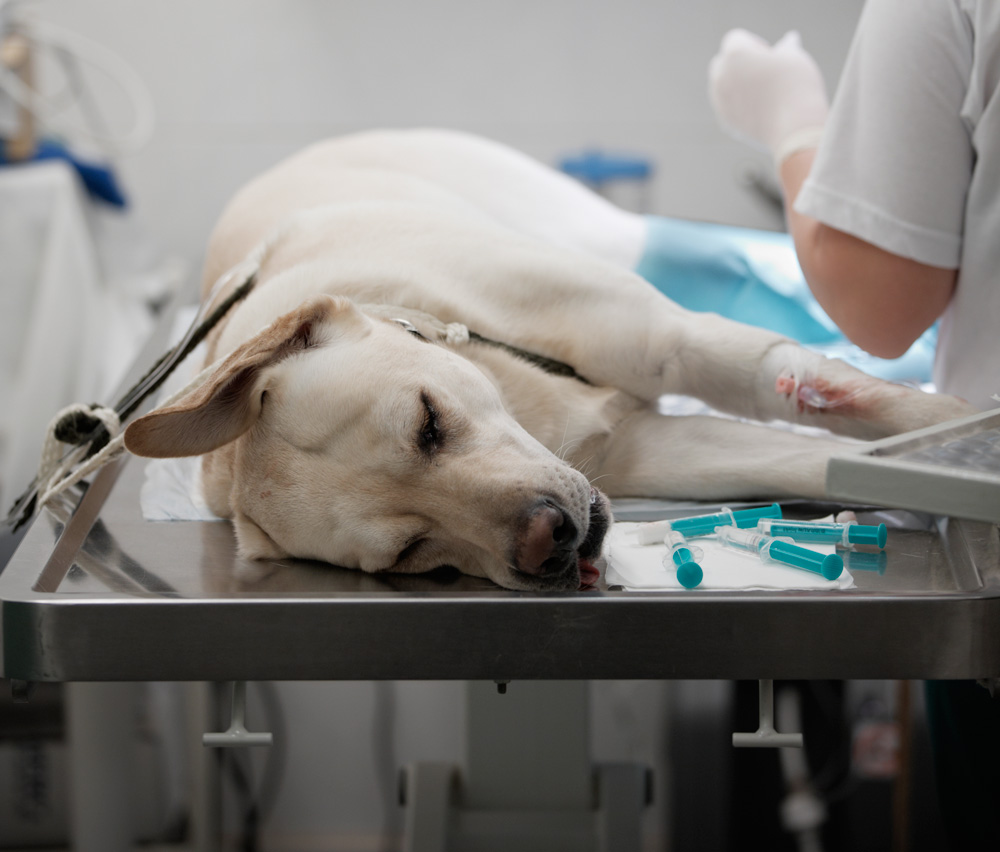The Most Common Canine Diseases – How to Protect Your Dog
11/05/2015
It’s every dog owner’s worst nightmare; the moment when their dog is ill. Apart from the fact that they will obviously be very worried about their beloved canine companion, there are also vets bills to consider and having to explain things to children if the dog is a family pet. Minimising the risk of contracting illnesses and diseases is the best way of protecting your dog, and your family, from the worry and also financial burden of a poorly pooch. Here, we take a look at some of the most common canine diseases and if there is anything you can do to protect your dog against them.
Allergic Dermatitis
Symptoms: red patches, spots, pimples, scabs, crusts, thicker skin in patches, flaky or scaly skin, hair loss, an unpleasant smell coming from the skin, itching.
Nutrition is vital to a healthy skin and, whilst allergic dermatitis can also be caused by hormonal imbalances, parasites and environmental factors such as an allergy to dust mites or pollen, it can always be improved by ensuring your dog is consuming a nutritionally-balanced dog food that includes a good quality protein source, Omega 3 and 6 and vitamin E.
Diabetes Mellitis
A condition that develops when your dog cannot use glucose in a way that effectively controls levels of sugar in the blood. Lack of sufficient levels of insulin, which is made in the pancreas and regulates the use and storage of blood sugar, can be life-threatening.
Symptoms: increased thirst, vomiting, weight loss, develops cataracts, lack of appetite, tired and no energy.
Your vet will be able to establish how much medication your dog requires and will set up regular appointments to monitor levels of glucose and change medication if necessary. The vet will also recommend a strict routine involving exercise and good nutrition. Weight can be a major contributing factor to diabetes in dogs and maintaining a healthy weight will make controlling glucose and insulin levels easier.
Gastrointestinal and Digestive Disorders
An umbrella term that covers a multitude of diseases and disorders including acute gastroenteritis (a short-term condition usually caused by a dog eating the wrong food, a foreign object, a toxic substance, etc), colitis (inflammation of the lining of the colon, often caused by whipworms, foreign objects, tumours and food allergies, among other things), constipation, diarrhea and pancreatitis.
Symptoms: vomiting, flatulence, lack of energy, weight loss, abdominal pain, diarrhea, constipation, regurgitation.
Whilst gastrointestinal problems can have a serious root cause, many cases can be solved by simply taking a look at your dog’s diet. If they’re eating inappropriate, human food, rancid food or have a simple food intolerance, then changing to a dog food that has been specially formulated for dog’s with sensitive stomachs may be the answer. Your vet will carry out all the testing required to get to the bottom of the problem!
Heart Disease
Sadly a natural part of ageing, heart disease can be exacerbated by carrying too much weight and can also be more common in certain breeds.
Symptoms: tiredness, fainting, breathing difficulties, lack of energy, can be similar to those of other diseases, so heart disease is something that your vet will be on the look out for as your dog matures. If a heart problem is suspected, the vet will use a variety of diagnostic tests to determine the exact problem.
Medication and treatment, along with good nutrition and moderate exercise can all make heart disease easily controlled and less of a life sentence for your dog.
Kennel Cough
This is a common infection that we’ve discussed in a previous article. The common name of infectious canine tracheobronchitis, a highly contagious respiratory disease in dogs that, in severe cases, can lead to pneumonia and even death.
Symptoms: dry hacking cough, retching, watery nasal discharge and, in severe cases, a fever and lethargy.
A vaccination is available for kennel cough, which may be given if you know that your dog is likely to be boarding in kennels frequently throughout their life. In mild cases, your vet will probably recommend that the disease be left to run its natural course. However, if your dog is showing signs of being a more severe case, then antibiotics will be prescribed.
Kidney Disease
The kidneys filter waste from the bloodstream and control fluid levels in the body, making them pretty essential organs, so kidney disease is always a serious condition. Unfortunately, serious symptoms only develop after 75% of kidney function has been lost and once chronic kidney disease develops it cannot be reversed.
Symptoms: increased thirst and urine production, weight loss, bad breath, vomiting, diarrhea, lack of energy, poor coat quality, decreased appetite and weight loss.
Your vet will be able to advise on treatment and managing the condition as well as treating any discomfort your dog may be in.
Lyme Disease
One of the most common tick-transmitted diseases, lyme disease can have serious complications leading to disease of the kidneys if not caught soon enough.
Symptoms: the most common symptom is lameness in one or more legs, lasting three to four days, disappearing only to return a few days later. Other symptoms can include a stiff walk, sensitive to the touch and difficulty breathing.
Treatment is with antibiotics and can take four weeks to clear, in some cases joint pain may linger and never fully disappear.
As with all health concerns, it is essential that a qualified, trusted vet is consulted in all aspects of your dog’s health. Don’t forget that diet is a very significant contributor to a dog’s health and that Gilbertson & Page foods are very carefully formulated to provide for differing life-stages, condition and activity levels. Choosing the right food is one of the best ways of maintaining or improving your dog’s general health over the years.



